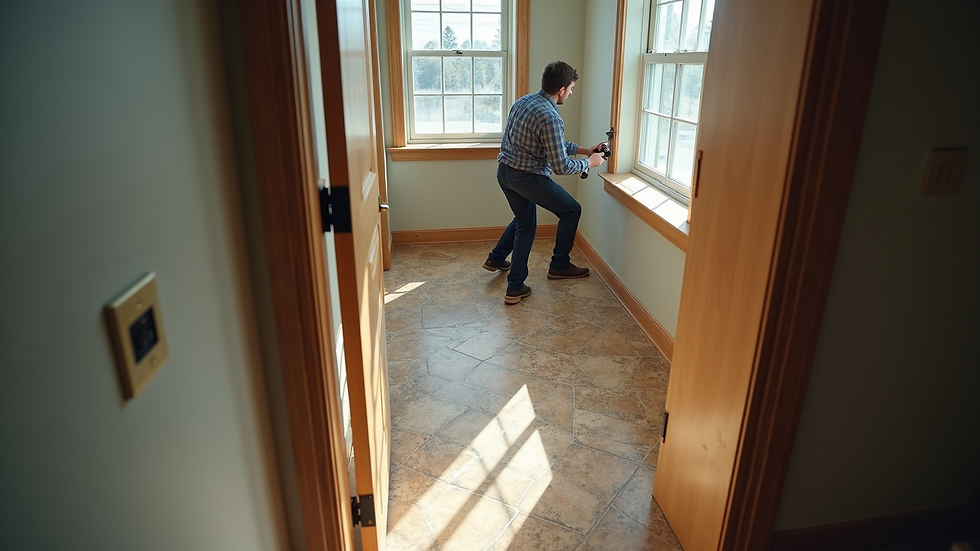The Importance of Thorough Home Inspections
- David Lee
- Mar 17, 2025
- 4 min read
Updated: Apr 28, 2025
Buying a home is one of the most significant investments most people will make in their lifetime. It is an exhilarating experience, but it can also be fraught with anxiety, especially when it comes to ensuring that your new home is safe and sound. One critical step in the home buying process is to conduct thorough home inspections. This post will explore the importance of home inspections and how they can save you time, money, and stress in the long run.
Home Inspections
Home inspections are detailed evaluations conducted by qualified professionals to assess the condition of a property. These inspections cover a wide range of areas, such as the roof, foundation, plumbing, electrical systems, and more. The goal is to uncover any potential issues that may not be visible during a typical walk-through.
Many buyers overlook the significance of home inspections, thinking that if the property looks good, it must be in good shape. Unfortunately, this is not always the case. According to the American Society of Home Inspectors, nearly 80% of homes have some defects. By investing in a comprehensive inspection, you can identify these problems before you finalize your purchase.

The Benefits of Home Inspections
Conducting a home inspection provides a plethora of benefits. First and foremost, it can help you avoid costly repairs down the line. Imagine discovering a major plumbing issue after you’ve moved in—repairs can quickly spiral into thousands of dollars.
Additionally, a home inspection can provide peace of mind. Knowing that a professional has thoroughly evaluated your new home will allow you to proceed with your purchase feeling more secure. Most home buyers report a higher level of satisfaction when they conduct an inspection before closing.
Moreover, home inspections can strengthen your negotiating position. If deficiencies are found, you can request repairs or ask for a price reduction from the seller. This can save you money and allows you to factor in expected repairs in your budget.

What is a Home Inspector Responsible For?
A home inspector is responsible for evaluating the visible and accessible components of a home. Inspectors are trained to prepare comprehensive reports that detail their findings. They evaluate critical aspects such as:
Roof: Inspectors check for missing shingles, leaks, and overall condition.
Foundation: They look for cracks, moisture issues, and structural integrity.
Electrical Systems: Inspectors assess wiring, outlets, and circuit breakers to ensure safety and compliance with codes.
Plumbing: They check for leaks, water pressure, and the condition of pipes and fixtures.
HVAC System: Inspectors evaluate heating and cooling systems for functionality and efficiency.
Understanding what a home inspector is responsible for can help you know what to expect during the inspection process. You can also use this knowledge to prepare any questions you might have for them.
Common Issues Discovered During Inspections
It is essential to know some of the most common issues that home inspectors typically discover. This information can help you prepare for what might be flagged in your report. Some prevalent problems include:
Roof Problems: As mentioned earlier, roofs can be a significant area of concern. Common issues include damaged shingles, improper installations, and leaks.
Pest Infestations: An inspector may find signs of termites or rodents, which can cause severe damage if not addressed.
Plumbing Issues: Hidden leaks and outdated plumbing fixtures often come to light during inspections.
Electrical Problems: Non-compliant wiring and overloaded circuits are typical findings that pose safety risks.
HVAC Issues: Old or poorly maintained heating and cooling systems can lead to inefficiency and malfunctions.
Being aware of these common issues can help you assess the risks when considering a property and prepare for discussions with your real estate agent or seller regarding repairs or price negotiations.

The Value of Hiring a Professional
While some buyers may consider conducting their own inspection to save money, hiring a qualified home inspector is crucial. Professional inspectors have the training and experience to identify potential problems that the average person may overlook. They also have access to specialized tools that can facilitate a thorough examination.
In addition, a professional inspection comes with the advantage of an unbiased perspective. A qualified home inspector can provide an objective opinion about the property and highlight issues that may need your attention. This impartial view is key, especially when you are emotionally attached to the home you want to buy.
Tips for Choosing the Right Home Inspector
When selecting a home inspector, consider the following tips to ensure you find the right fit:
Check Qualifications: Ensure that the inspector has the proper certifications and licenses. Experience is crucial, so look for someone with a solid track record.
Read Reviews: Customer testimonials can provide insights into an inspector's reliability and quality of work.
Ask Specific Questions: Inquire about what the inspection will cover and the tools they will use. This will help you understand what to expect.
Request a Sample Report: A reputable inspector should provide a sample report that shows how findings are documented, helping you gauge their thoroughness.
Inquire About Continuing Education: Home inspection standards can change, so a good inspector keeps up-to-date on the latest practices and technologies.
Investing time in choosing the right professional will pay dividends in the long run, as it will increase your confidence in your home purchase.
Making Informed Decisions
After the home inspection, it’s essential to carefully review the report. This document should outline all the findings, including any issues noted and recommendations for repairs. Use this report to make informed decisions.
You may find that the issues listed are minor and easily manageable. Alternatively, you may discover significant problems that warrant further discussion with the seller or even reconsidering your offer.
Home inspections empower you to approach your home-buying process with knowledge, allowing you to make informed decisions based on the condition of the property rather than assumptions or emotions.
In summary, thorough home inspections are invaluable. They can save you considerable money, provide peace of mind, inform your negotiations, and ultimately protect your investment. As you navigate the home buying process, don’t underestimate the importance of this critical step. Take the time and effort to conduct a proper inspection, and you’ll be better for it.









Comments